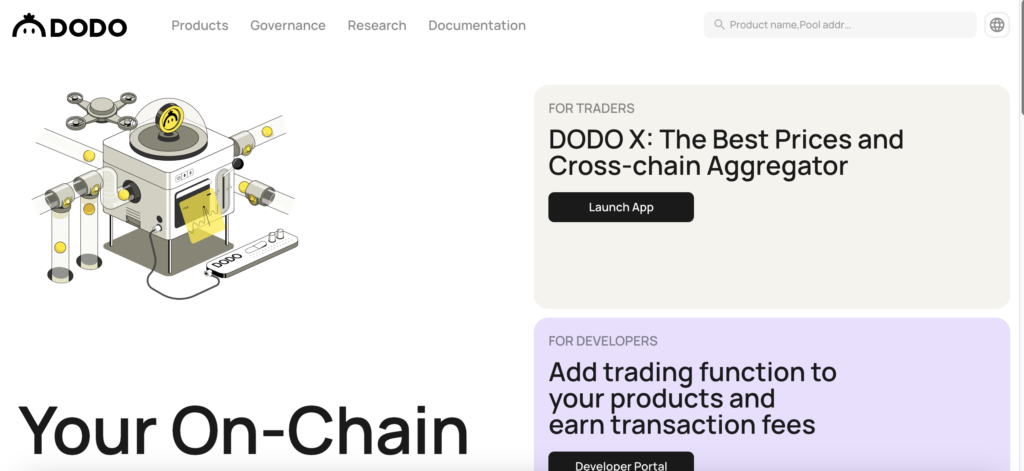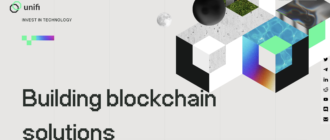DODO is a decentralized finance (DeFi) platform known for its proactive market maker (PMM) algorithm, which aims to optimize liquidity of assets in a manner that reduces slippage and temporary loss compared to traditional automated market makers (AMMs). By dynamically adjusting market prices, DODO seeks to offer better pricing and increased liquidity flexibility for both traders and liquidity providers.

Project History
Launched in 2020, DODO was developed by a team of blockchain enthusiasts led by Diane Dai, Radar Bear, and an unnamed technology lead with experience in blockchain technology. The project rapidly gained attention for its novel approach to decentralized trading, securing early funding and partnerships with prominent players in the blockchain ecosystem. Notable milestones include significant funding rounds led by Framework Ventures, Pantera Capital, and Binance Labs, which facilitated DODO’s growth and adoption.
What is DODO?
DODO positions itself as a next-generation on-chain liquidity provider, which leverages the PMM algorithm to enable asset trading with minimal slippage by simulating human trading strategies. Unlike AMMs that require liquidity providers to fund a pool with multiple tokens, DODO allows providers to contribute a single token while maintaining sufficient liquidity across the trading pair spectrum.
How DODO Works
DODO operates on a sophisticated technological foundation designed to address inherent limitations found in traditional decentralized exchanges. Central to its innovation is the Proactive Market Maker (PMM) algorithm, which represents a significant departure from the conventional automated market maker (AMM) models.
Proactive Market Maker (PMM) Technology
Unlike AMMs that rely on constant function market makers (CFMMs) to maintain liquidity, DODO’s PMM algorithm leverages price oracles to gather off-chain market data, allowing it to adjust prices more accurately in real-time. This oracle-driven approach enables the PMM to reduce impermanent loss by aligning the prices on DODO closely with those of external markets. Furthermore, the PMM provides single-asset liquidity entries, mitigating the typical two-token requirement of traditional AMMs and reducing entry barriers for liquidity providers.
Blockchain Infrastructure
DODO is primarily built on the Ethereum blockchain, taking advantage of its robust and secure infrastructure. However, it also ensures interoperability and flexibility by supporting cross-chain functionalities through bridges to other blockchains such as BNB Smart Chain and Polygon. This multi-chain approach allows DODO to leverage the strengths of various blockchains, optimizing transaction speeds and minimizing costs.
Consensus Mechanism
Being built on Ethereum, DODO inherits the blockchain’s transition from a Proof of Work (PoW) to a Proof of Stake (PoS) consensus mechanism. This shift significantly enhances the network’s scalability and energy efficiency. The PoS mechanism also aligns with DODO’s governance model, wherein DODO token holders can stake their tokens to participate in the governance process, influencing decisions such as feature implementations and protocol upgrades.
Unique Features and Innovations
DODO differentiates itself with several unique features:
- SmartTrade: A decentralized trading aggregator that finds the best liquidity across multiple sources, not limited to DODO’s PMM pools, ensuring traders can execute orders at the most favorable prices.
- Crowdpooling: An original liquidity offering method that guarantees equal opportunity for participation in liquidity provision without the risks of front-running and price manipulation inherent in other models.
These technological elements make DODO not just a trading platform but a comprehensive liquidity solution in the DeFi space, aiming to solve the trade-offs between capital efficiency and price consistency in decentralized trading environments. Through its continuous technological innovation, DODO seeks to refine its ecosystem to cater to both retail and institutional participants in the cryptocurrency market.
Tokenomics of DODO
DODO operates with a native utility token rather than a coin, reflecting its specific use within the DODO ecosystem rather than functioning as an independent digital currency. This distinction is crucial as it underscores the token’s integral role in facilitating operations on the platform, from governance to transaction fee payments.
Nature and Utility of the DODO Token
The DODO token is central to numerous mechanisms within the platform. It is used for governance, where token holders vote on proposals that shape the platform’s future development. It also incentivizes liquidity providers through liquidity mining programs and is used to pay for transaction fees within the platform at a discounted rate for holders.
Emission Model and Distribution
DODO’s emission model is designed to prevent inflation and encourage long-term sustainability. The total supply of DODO tokens is capped, which counters the depreciation of token value through excessive supply. The distribution of tokens is meticulously planned to support platform growth—significant portions are allocated for community incentives, team retention, and ecosystem development, ensuring that stakeholders are aligned with the platform’s long-term success.
Price Dynamics and Market Factors
The price of DODO tokens is subject to market dynamics and is influenced by several factors, including the platform’s adoption rate, overall market conditions, and innovations introduced by the team. For instance, enhancements in the platform’s capabilities or expansion into new blockchains can positively affect token demand.
Staking and Economic Incentives
DODO also introduces a staking mechanism, where token holders can stake their DODO to earn rewards. This not only helps secure the platform through distributed governance but also provides a staking yield, drawing additional participation from the investor community. The staking rewards are dynamically adjusted based on the total number of tokens staked, ensuring a balanced return that correlates with the level of participation.
The DODO tokenomics are carefully crafted to ensure that the token has intrinsic value as a utility token within the ecosystem, providing multiple use cases that enhance user engagement and platform growth. This comprehensive approach to token distribution, coupled with strategic utility applications, positions DODO to maintain a vibrant and growing DeFi ecosystem.
Where to Buy DODO Tokens
DODO tokens are widely available on several major cryptocurrency exchanges, making them accessible to a diverse range of investors and traders. Here are some of the primary platforms where DODO can be purchased:
- Binance: One of the largest and most popular cryptocurrency exchanges globally, Binance offers DODO trading with multiple pairings, including fiat and other cryptocurrencies.
- HTX (formerly Huobi): Known for its robust platform and extensive range of trading pairs, HTX provides a solid market for trading DODO.
- MEXC: This exchange is recognized for its user-friendly interface and a wide selection of cryptocurrency tokens and pairs, including DODO.
- KuCoin: Often favored by a broad international audience, KuCoin offers DODO trading and is known for its user-friendly service and community engagement.
When purchasing DODO tokens, it’s essential to consider the exchange’s reputation, security measures, and the available trading pairs to ensure a safe and convenient trading experience.
Where to Store DODO Tokens
Storing DODO tokens securely is crucial, and several wallets offer robust security features along with ease of use. Here are recommended wallets for holding DODO:
- MetaMask: A popular choice for Ethereum and ERC-20 tokens like DODO, MetaMask can be used as a browser extension or mobile app, providing flexibility and ease of integration with DeFi platforms.
- Trust Wallet: This mobile wallet supports a wide range of cryptocurrencies, including DODO, and offers an easy-to-use interface for accessing and managing tokens on the go.
- Ledger Hardware Wallet: For those seeking an extra layer of security, Ledger hardware wallets provide offline storage for DODO tokens, significantly reducing the risk of online threats.
- Trezor: Another secure hardware wallet option that supports DODO tokens, Trezor offers robust security measures to safeguard your assets from online risks.
- WalletConnect: This open protocol allows DODO holders to connect their mobile wallets to desktop DApp clients securely, making it a versatile choice for interacting with DeFi applications.
Choosing the right wallet depends on your needs for security, convenience, and frequency of use. Hardware wallets are suited for long-term holders concerned with security, while mobile and web wallets offer more convenience for regular trading and DeFi interactions.
Future Prospects and Development Forecast
The growth of DODO is built on the platform’s unique approach to decentralized liquidity provision and its ability to address the pain points of traditional AMM protocols. The proactive market maker algorithm positions DODO as a flexible and efficient solution, attracting a range of clients and partners.
Clients and Partners
- Clients: DODO’s primary users include liquidity providers seeking better capital efficiency and traders aiming for minimized slippage. The platform has also attracted decentralized finance (DeFi) enthusiasts who are interested in accessing liquidity pools without the constraints of traditional AMMs.
- Partners: DODO has formed strategic partnerships with various industry players, including:
- BNB Smart Chain: Integration with Binance’s blockchain broadens DODO’s reach and access to a more diverse market.
- Polygon: Partnering with Polygon provides scalable and low-cost transactions for DODO’s users.
- Chainlink: Chainlink oracles offer DODO reliable external price data for accurate pricing in its PMM algorithm.
- Covalent: Covalent powers DODO with detailed blockchain data for improved analytics and reporting.
- The Graph: This decentralized indexing protocol provides DODO with enhanced data querying capabilities.
These partnerships not only expand DODO’s technological capabilities but also contribute to a more extensive and interconnected ecosystem.
Ecosystem
DODO’s ecosystem revolves around several core features that enhance its value proposition:
- SmartTrade: An advanced aggregator that sources liquidity across the entire DeFi landscape for optimal trading prices.
- Crowdpooling: A permissionless, equal-opportunity mechanism for launching new token pools.
- DODO Private Pools (DPP): Customizable liquidity pools that offer full control over trading parameters and flexibility for liquidity providers.
- DODO Vending Machine: A simplified mechanism that allows anyone to create a liquidity pool easily.
Development Forecast
Given the continuous innovations within the platform and its integration with multiple blockchain networks, DODO is expected to maintain its growth trajectory. Future enhancements are likely to include expanding cross-chain compatibility, optimizing the PMM algorithm for even better liquidity management, and introducing new products aimed at institutional traders.
Conclusion
DODO represents a significant evolution in the DeFi space, introducing novel concepts and technologies that address some of the inefficiencies found in earlier generation platforms. With its unique proactive market maker model and commitment to continuous improvement, DODO is well-positioned to remain a key player in the DeFi landscape, offering promising opportunities for both users and investors. As the platform evolves, it may well set new standards for liquidity provision and decentralized trading.






